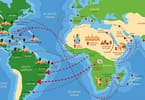UGANDA (eTN) – Recently-published studies revealed that over the past 50 years, the Eastern African region has experienced an average increase in temperatures by 1 degree Celsius, and suggestions were made that this may, together with other factors, have contributed to the accelerated cycles of drought and floodings and the sharply-risen needs to import food and depend on crisis intervention by the international community.
The forecast for this year, especially in the region’s economic powerhouse Kenya, again proposes an almost failure of the rains between April and June, which could have a devastating effect on the pastures for livestock and also for the farmers across the country. The erratic rains are partially blamed on the warming of the Indian Ocean waters, which arguably causes less rainfall over the African continent, a claim, however, still under further investigation in the absence of sufficient hard data.
Nevertheless, the writing is again on the wall and governments in Ethiopia, Kenya, Uganda, Tanzania, Rwanda, Burundi, and South Sudan are better starting now to put measures into place to avoid large sections of their respective populations going hungry, should yet another harvest fail.
WHAT TO TAKE AWAY FROM THIS ARTICLE:
- Recently-published studies revealed that over the past 50 years, the Eastern African region has experienced an average increase in temperatures by 1 degree Celsius, and suggestions were made that this may, together with other factors, have contributed to the accelerated cycles of drought and floodings and the sharply-risen needs to import food and depend on crisis intervention by the international community.
- The forecast for this year, especially in the region's economic powerhouse Kenya, again proposes an almost failure of the rains between April and June, which could have a devastating effect on the pastures for livestock and also for the farmers across the country.
- The erratic rains are partially blamed on the warming of the Indian Ocean waters, which arguably causes less rainfall over the African continent, a claim, however, still under further investigation in the absence of sufficient hard data.






















